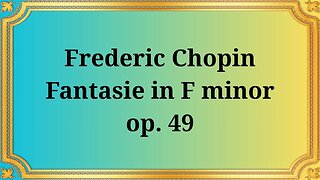Premium Only Content

Hector Berlioz Benvenuto Cellini Overture
#Classical #Romantic #Berlioz #OperaOverture #RomanticEra #OrchestralShowPiece #FrenchMusic #vinyl
Publication date 1947
San Francisco Symphony Orchestra
Hector Berlioz's Benvenuto Cellini Overture (1838) is a stirring concert introduction that captures the fiery spirit of its operatic source while also performing brilliantly as an orchestral showpiece. Although the entire opera initially struggled for recognition, the overture has become one of Berlioz's most frequently performed works, demonstrating his genius for orchestral color and dramatic impulse. Written as an overture to Berlioz's first opera, Benvenuto Cellini, the piece introduces us to the story of the turbulent Renaissance artist. The opera's 1838 Paris premiere was a failure, criticized for its unconventional structure, but the overture immediately struck audiences with its vitality. Berlioz later reworked the work, creating the version most often heard today. The overture follows a modified sonata form, exploding with rhythmic energy and melodic inventiveness:
- Explosive opening: a bold, syncopated string theme sets an insistent tone
- Lyrical contrast: a graceful second woodwind theme offers respite
- Brilliant development: Berlioz's signature orchestration shines through:
- Sparkling woodwind text
- Heroic brass fanfares
- Pulsating string passages
- Dramatic crescendo: the piece builds to a stirring conclusion
Around 9 minutes long, it is the perfect embodiment of Berlioz's romantic style - passionate, colourful and technically challenging.
The Overture tests orchestras:
- Fast string passages that demand precision
- Open woodwind solos
- Complex rhythmic interplay
- Dynamic extremes from whisper-quiet to thunderous
These challenges make it a favorite of conductors and a crowd favorite when performed well.
Notable interpretations include:
- Sir Colin Davis (a renowned Berlioz scholar)
- Leonard Bernstein
- John Eliot Gardiner
The Overture often appears in "pop" concerts and orchestral collections because of its immediate appeal.
While the complete opera remains rare, the overture has survived because:
1. It perfectly combines structural integrity with emotional expression
2. It showcases Berlioz's innovative orchestration
3. It delivers great excitement in a compact form
4. It serves as an ideal introduction to the music of the Romantic era
Dear listeners, you have the opportunity to support the channel:
https://t.me/rad_siar_al_bot
https://destream.net/live/RadSiarAl/donate
-
 11:13
11:13
Classical music_Music Inspiration
1 month agoFrederic Chopin Fantasy in F minor, Op. 49
722 -
 1:46:26
1:46:26
The Michelle Moore Show
18 hours ago'The Religion Invasion In the U.S. and the Deep State Agenda' Guest, Mark Taylor: The Michelle Moore Show (Nov 3, 2025)
21.3K21 -
 LIVE
LIVE
TruthStream with Joe and Scott
5 days agoSovereign Codes & Cosmic Infrastructure,Ufo's, UAP's, Monads, Matrix Satellites, Interstellar Visitors, SYRONA #505
315 watching -
 LIVE
LIVE
Lofi Girl
2 years agoSynthwave Radio 🌌 - beats to chill/game to
148 watching -
 5:55:11
5:55:11
MattMorseTV
11 hours ago $93.78 earned🔴Trump's '60 Minutes' INTERVIEW + MUCH MORE.🔴
157K48 -
 2:02:36
2:02:36
Badlands Media
15 hours agoBaseless Conspiracies Ep. 157: Jack the Ripper, the Crash & the Great Disclosure Countdown
35.6K20 -
 2:06:09
2:06:09
Inverted World Live
12 hours agoMysterious Crash at Area 51 | Ep. 134
40K14 -
 2:48:59
2:48:59
TimcastIRL
10 hours agoTrump Endorses Cuomo, Says NO COMMIE MAMDANI, Obama REFUSES To Endorse Mamdani | Timcast IRL
276K202 -
 5:51:16
5:51:16
Drew Hernandez
1 day agoGOP CIVIL WAR: TUCKER CARLSON DERANGEMENT SYNDROME AT ALL TIME HIGH
57.2K42 -
 14:44
14:44
Sponsored By Jesus Podcast
1 day agoYou Can't Serve God & MONEY | Is Money the Root of All Evil?
26K25